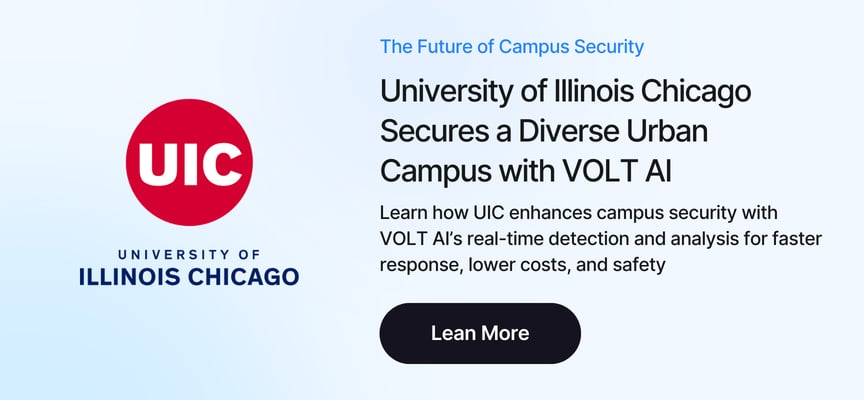Using Third Party Security for Campus Security
Successfully implementing third party security services requires careful partner selection based on experience, training quality, and technology capabilities, followed by establishing clear performance metrics and communication protocols that ensure accountability. he most effective third party vendor security implementations treat providers as true partners in campus safety while maintaining strong oversight and leveraging modern security technology to create a comprehensive protection program that serves the entire campus community.
- Evaluate potential third party vendor security providers based on clear criteria including experience, training programs, and technology integration capabilities to mitigate potential risk.
- Establish detailed service level agreements that outline response times, reporting requirements, and performance metrics to ensure strong security controls.
- Implement robust oversight processes including regular performance reviews and clear communication channels
- Consider how third party security teams will integrate with existing campus safety infrastructure and technology to strengthen security measures.
- Look for providers willing to embrace modern security technology to enhance their effectiveness while conducting regular security assessments to identify potential vulnerabilities.
Getting Started
As campus safety needs grow increasingly complex, many institutions are turning to third party security companies to augment their protection capabilities. While outsourcing security functions can provide valuable expertise and resource flexibility, success depends heavily on choosing the right partner and implementing proper oversight measures to mitigate potential risk.
This guide explores how to effectively evaluate, implement, and manage third party security services to create a safer campus environment through comprehensive risk management.
Understanding the Role of Third Party Security
Before diving into selection criteria, it's essential to understand how third party security fits into your broader campus safety strategy. Professional security companies can provide various services, from basic patrol and monitoring to comprehensive security management.
- Access control and visitor management: Implementation and oversight of campus entry protocols including ID verification, visitor badges, and monitoring of access points to ensure only authorized individuals enter campus facilities.
- Regular security patrols: Systematic monitoring of campus grounds through scheduled foot and vehicle patrols designed to maintain visibility, deter criminal activity, and identify potential vulnerabilities.
- Emergency response: Rapid deployment of trained security personnel to address immediate threats, medical emergencies, or other critical situations requiring swift professional intervention.
- Special event security: Dedicated security planning and staffing for campus gatherings, sporting events, ceremonies, and other large-scale activities requiring enhanced safety measures.
- Security technology monitoring: Active surveillance of security cameras, alarm systems, and other security infrastructure to ensure real-time threat detection and incident response.
- Training and compliance management: Development and implementation of security protocols, staff training programs, and compliance verification to maintain consistent security standards across campus.
The key is identifying which functions align with your institution's needs and existing security infrastructure. Third party security should enhance, not replace, your core campus safety capabilities.
Evaluating Potential Security Partners
When considering third party security providers, a systematic evaluation process helps ensure you select a partner capable of meeting your institution's specific needs. This critical phase requires careful attention to several key factors, including security assessment to pinpoint potential risks.
Experience and Expertise
The right security partner should bring relevant experience in educational environments and a deep understanding of campus safety challenges. They should be able to demonstrate:
- Years of experience in educational security
- Knowledge of relevant regulations and compliance requirements
- Understanding of unique campus safety dynamics
- Track record with similar institutions
- References from current educational clients
A provider's experience in educational settings is particularly valuable as campus environments present unique security challenges compared to other facilities.
 Read the Complete Guide: The Future of School Security in the Modern Era
Read the Complete Guide: The Future of School Security in the Modern EraRead the Complete Guide: The Future of School Security in the Modern Era
Training and Personnel Quality
The effectiveness of third party security largely depends on the quality and preparation of their security officers.
- Comprehensive initial training programs
- Ongoing professional development
- Background check procedures
- Officer retention rates and turnover statistics
- Supervision and quality control measures
- Crisis response preparation
The best security partners invest heavily in their personnel, ensuring they're well-prepared for campus environments.
Many third party security companies will need to initiate specialized training before working in a campus environment. Often the college or university who engages with them will need to make sure they add these specific types of training to their regimen when they win the bid for services (as they don’t often have these trainings by default).
Core Security Certifications
Before specializing in campus security, officers should complete fundamental security training programs. These foundational certifications establish basic competencies necessary for any security role.
- State-mandated security officer certification
- CPR and First Aid certification
- Emergency response protocols
- Basic defensive tactics
- Report writing and documentation
- Legal authority and limitations
These baseline certifications should be regularly renewed to maintain current best practices.
Campus-Specific Emergency Response
Educational environments face unique emergency scenarios that require specialized response training. Security personnel must be prepared to handle various situations while maintaining campus safety.
Active Threat Response
- Active shooter response protocols
- Lockdown procedures
- Emergency notification systems
- Evacuation management
- Crowd control techniques
- Coordination with local law enforcement
Medical Emergency Response
- Recognition of common campus medical emergencies
- Response to mental health crises
- Sports injury protocols
- Substance abuse recognition and response
- Automated External Defibrillator (AED) operation
- Mass casualty incident management
Mental Health and Crisis Intervention
Campus security officers often encounter students experiencing mental health challenges or personal crises. Proper training in these areas is essential for effective response and support.
Mental Health Response
- Recognition of mental health symptoms
- De-escalation techniques
- Suicide prevention protocols
- Trauma-informed response methods
- Communication with counseling services
- Resource referral procedures
Crisis Intervention
- Verbal de-escalation techniques (this is an especially important one that is not typically part of a third party security company’s existing training regimen)
- Non-violent crisis intervention
- Conflict resolution strategies
- Emotional first aid
- Peer support awareness
- Stress management techniques

Read the Case Study: How UIC Secures a Diverse Urban Campus with VOLT
Technology Integration Capabilities
Modern campus security requires seamless integration of human resources and technology solutions.
- Experience with various security technologies
- Ability to work with existing systems
- Knowledge of advanced security platforms
- Willingness to adapt to new technology
- Data management and reporting capabilities
A strong third party security partner should be comfortable leveraging technology like VOLT AI's video intelligence platform to enhance their effectiveness.
Creating Effective Service Agreements
Once you've selected a third party security provider, establishing clear expectations through detailed service level agreements becomes crucial. These agreements should outline all aspects of the security service relationship.
Performance Metrics
Define specific, measurable criteria for evaluating security service effectiveness:
- Response time requirements
- Patrol frequency and coverage
- Incident reporting timeliness
- Training completion rates
- Technology utilization metrics
- Customer satisfaction measures
Regular review of these metrics helps ensure accountability and service quality.
Communication Protocols
Establish clear channels and expectations for ongoing communication:
- Regular performance review meetings
- Incident reporting procedures
- Emergency notification processes
- Stakeholder update requirements
- Technology alert response protocols
- Escalation procedures
Effective communication is essential for maintaining strong security partnerships.
Implementation and Integration
A successful third party security program requires careful attention to integration with existing campus safety measures.
Technology Integration
Ensure security personnel can effectively utilize campus safety technology:
- Access control systems
- Video surveillance platforms
- Emergency notification systems
- Incident management software
- Communication equipment
- Data management tools
Modern security solutions like AI-powered video monitoring can significantly enhance third party security effectiveness, while keeping the total costs of hiring third party services down significantly.
Campus Community Integration
Help third party security personnel become valued members of the campus community:
- Introduction to key stakeholders
- Familiarization with campus culture
- Understanding of specific population needs
- Integration with existing safety teams
- Clear roles and responsibilities
- Community engagement opportunities
Strong community integration helps security team better serve and protect your campus.
Ongoing Management and Oversight
Maintaining effective third party security services requires consistent oversight and management. Regular evaluation helps ensure service quality remains high and adapts to changing campus needs.
Performance Reviews
Conduct regular assessments of security controls effectiveness:
- Monthly performance metric reviews
- Quarterly service evaluations
- Annual contract assessments
- Incident response analysis
- Staff feedback collection
- Community satisfaction surveys and security ratings
Regular reviews and security assessment help identify areas for improvement and ensure accountability.
Continuous Improvement
Implement processes for ongoing service enhancement:
- Regular training updates
- Technology adoption assessment
- Process refinement
- Best practice implementation
- Feedback incorporation
- Service expansion evaluation
The security landscape constantly evolves, and your third party security services should evolve with it.
Final Thoughts
Implementing third party security services effectively requires careful planning, clear expectations, and ongoing oversight. By following these guidelines and leveraging modern security technology, institutions can create robust campus safety programs that protect their communities effectively. Success comes from treating security providers as true partners in campus safety while maintaining clear standards and accountability measures through continuous risk management efforts.
The key is finding the right balance between outsourced expertise and internal oversight, always keeping the ultimate goal in mind: creating a safer campus environment where learning can flourish. When done right, third party security becomes an integral part of your campus safety ecosystem, working seamlessly with other security measures to protect your community.

